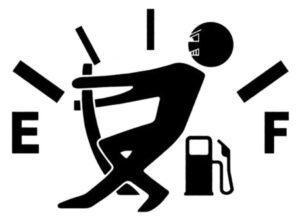Are You Running Out of Gas?
Very few of us would drive for long without a seatbelt, especially with the loud blaring noises most cars make to alert us of the fact that we’ve forgotten to take such an important precaution. But if you ask people how long they’ve driven accompanied by a warning light that tells them they are due for an oil change or a tire rotation or are low on fuel, you’d likely hear a different story.
The same tends to be true in the way we approach our work and personal lives. We readily give our attention, time and energy to the issues that demand our attention – urgent requests, ringing phones, things that are in our faces. But we are all too likely to ignore those subtle little warning signs that indicate we need general maintenance to stay healthy and vibrant enough to make it to our ultimate destinations.
Think about your own life for a moment. Chances are you’re very busy, with a lot on your plate and many things in the pipeline. You are likely juggling many balls – and not just at work. With telecommuting becoming more of the norm, separating your personal and professional life has likely become a bit more challenging, as the line has become more blurred than ever. You may not be spending as much time in your car, but your compulsion to jump on the computer to knock a few things out when you’d otherwise be having personal time has likely taken a huge leap – even more so if your work expands across different time zones. And when you do that, the minutes all too easily stretch into hours.
The tendency of most high achievers who find themselves shouldering an increased load is to double down on their efforts – to work harder, longer, faster. If that is a familiar pattern for you, you know that when you get locked and loaded on a target, you are very likely to dismiss (or completely overlook) the subtle indicators that you are overextending your capacity and putting yourself at risk.
Occasionally though, the stress and overwhelm come to a head and you can’t help but notice them. Just as a car whose oil has become very dirty or whose gas tank is running on fumes doesn’t quite operate as effectively, you too will begin to notice more and more visible signs that something has got to be done to get your system back in optimal working condition.
How does that show up for you?
Do your shoulders gradually creep closer to your ears? Does your breathing get more and more shallow? Do you find yourself clenching your fists? Gritting your teeth? Losing your temper more often than you’d like?
Perhaps it’s more of a gnawing awareness that something’s got to give. You might feel as though you’re not sure you can continue at this pace. You may have a feeling that something is missing, or out of kilter. You could find that the things that used to satisfy you just don’t move the needle anymore like everything is just blending together in a kind of gray mush that you are continually trudging through.
The good news is that this is a state you can definitely do something about.
It’s more a product of LACK of consciousness than anything. This means that when you intentionally make a conscious, deliberate decision that you are ready to do something different, you can – and you will.
This week, I want to share with you some tips that can help you regain your sanity and tend to those little warning signs that you may have been overlooking for a little too long.
Today, we’ll explore a common “success formula” that tends to get people into trouble. This success formula is one that is so ingrained into the fabric of our existence that you may not even be aware of it. It is the conditioning that leads us to believe that the harder we work, the more we do, the busier we are, the more successful/valuable/worthy we will be (pick the adjective that resonates most for you).
It is not without some merit. After all, it is true that most things worth working for do require some degree of effort, and that obstacles often require diligence and increased commitment and grit to overcome.
But this approach, when overdone, can lead to the very burnout that keeps you from operating at all.
While it is true that you need to practice the kind of resilience that will keep you in the game rather than forfeiting the race, the best race car drivers know that you have to make occasional pit stops to make it through the long haul. The best athletes know that their bodies need to rest in order to perform at their best. And the best leaders and executives understand that sometimes you need to slow down in order to speed up.
The assumption that underlies the “success formula” that turns against us is one that leads you to believe you don’t have time to slow down, to be intentional, to gain clarity on where it is you are going and what you need to do along the way. That assumption leads you to overlook the importance of reflecting on where you’ve been and how the journey is going, what’s working and what needs to change, and how you can shift your action in a way that aligns with your desired result. It leads you to keep driving even when your tank is empty, your oil is dirty and your tires are bald. It’ll drive you into a ditch (or worse).
The first step to keeping that kind of programming from derailing you is to become aware that it is in fact operating and to realize what the impact of that programming has been.
Human beings don’t change until the pain of staying the same is greater than the pain or discomfort of doing things differently. But we often don’t recognize that this pain is self-imposed – as a result of the kind of thinking that compels us to keep pushing when we need to take our foot off the gas. Instead, we attribute our exhaustion, frustration, disillusionment, overwhelm, etc. to our circumstances.
But what if it were overuse of the “success formula” itself that leads you to deal with stress in a way that actually makes things more stressful?
Do you believe you can’t afford to slow down?
Is it really true? If you were to insert an hour into your schedule to do something that tends to your well-being, or allows you to gain some clarity or to replenish your energy, would you really be worse off? Do you know others who somehow find a way to do slow down and take breaks every once in a while, or do the things they love – and still manage to perform well (maybe even better?)
When you believe you can’t slow down, you’ll take in information that confirms it and screen everything else out. So if all that comes to mind is what you’d have to lose, see what happens when you get curious about what you’d have to gain.
Just for a moment, think about who you could be if you no longer let that thought dictate your response. Would you be willing to entertain the idea that there may be some things you can do to interrupt that crazy compulsion that has a way of keeping you on a hamster wheel, running faster than ever but not really getting anywhere? Or pushing a big rock up a hill only to have it come rolling back down again and again?
All you need at this point is the curiosity to entertain the thought that perhaps that old “success formula” has some holes in it – and that if you are open and willing to find a better way, the path will reveal itself to you.
In the coming days, I’ll give you some more tips and tools that will help you find it.
If you’d like to more fully explore what your life and work could be like beyond the conditioning that may be holding you back, consider enrolling in the fall session of The Pinocchio Principle Unleashed: The Real Leader’s Guide to Accessing the Freedom & Flow of Your Unique Genius. This thirteen-week leadership development program is ideal for leaders and professionals experiencing high levels of stress, pressure and overwhelm who long to experience more passion, meaning and joy in their work and their lives and especially fitting for those who tend to take a lot on and want to minimize stress, pressure and overwhelm without sacrificing performance.
Public registration will open on September 1. Subscribers to DianeBolden.com are eligible to pre-register – email support@DianeBolden.com for more information.

